Hey there, fellow dog parent! I see you’re interested in learning more about Bearded Collie Eye Health. As a holistic veterinarian, I can tell you that our furry friends’ eyes are just as important as ours. And just like us, they can experience various eye problems. But fear not, I’m here to guide you through the common eye issues that Bearded Collies often face and how we can prevent and treat them.
Bearded Collies are known for their beautiful, flowing coats and expressive eyes. But did you know that their unique eye structure can make them susceptible to certain eye conditions? It’s true. From Bearded Collie Eye Disease to infections, these lovely canines can experience a range of eye health issues.
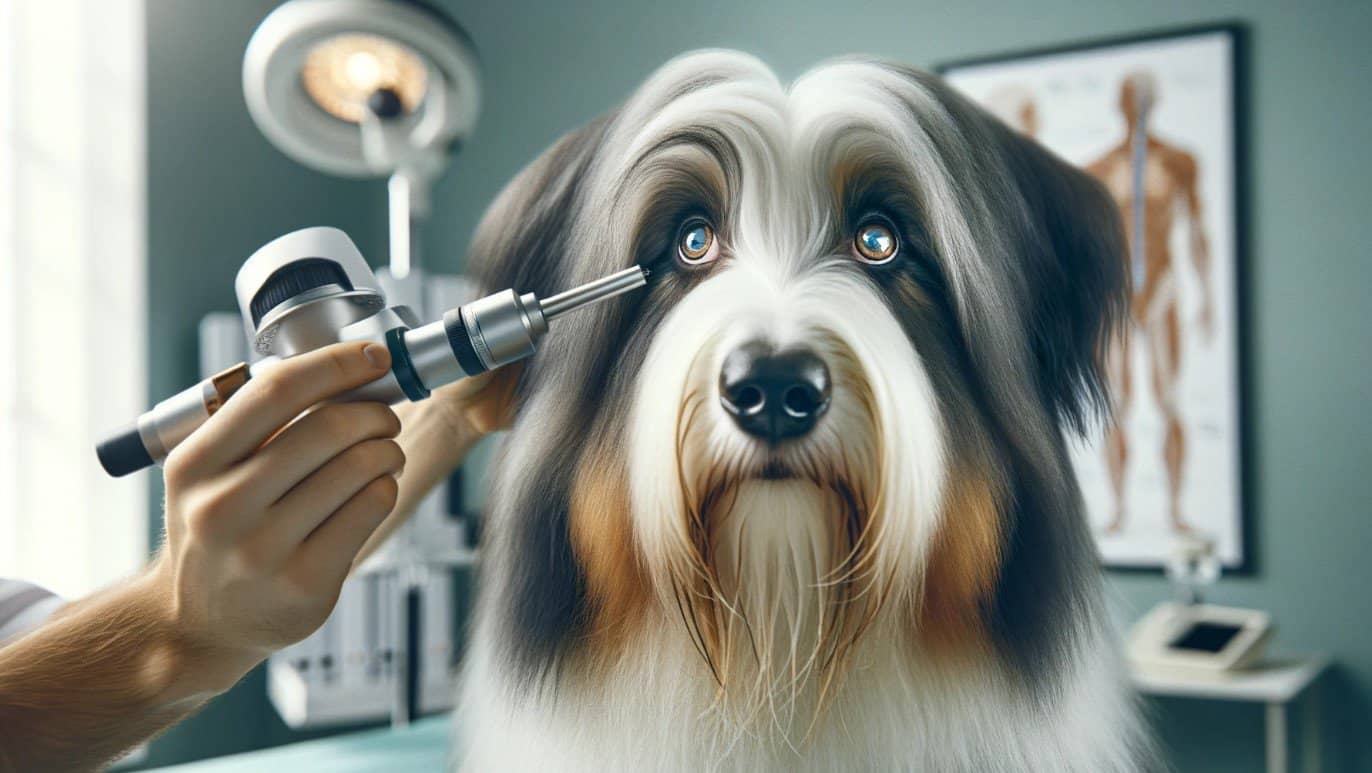
But the good news is, with proper care and attention to their diet, environment, and routine eye maintenance, we can significantly reduce the risk of these problems. And even if they do occur, there are effective treatments available. So, let’s take a closer look at Bearded Collie Eye Health – the conditions they may face and the solutions that can help. I promise, it’s not as daunting as it sounds!
Understanding Bearded Collie Specific Eye Structure
When it comes to maintaining your Bearded Collie’s eye health, it’s essential to understand their unique eye structure. It’s not just about the adorable, expressive eyes that make them so endearing – their eyes are a vital part of their overall health and well-being.
Bearded Collies, like most dog breeds, have eyes that are large and round, providing them with a wide field of vision. Their eyes are set wide apart and slightly to the side of their head, which gives them a distinctive, appealing look but also serves a practical purpose. This positioning allows them to have a broader visual range, which was beneficial for their original purpose as herding dogs.
The structure of the Bearded Collie’s eye is also remarkable for its three eyelids. Yes, you read that right – three! The third eyelid, known as the nictitating membrane or “haw,” is a thin, translucent tissue that helps to protect the eye and keep it moist. This is a feature that is common in many dog breeds, but it is particularly prominent in Bearded Collies due to their long, heavy coats.
Speaking of their coats, the Bearded Collie’s long, shaggy hair can sometimes obscure their eyes. While this may add to their charm, it can also lead to potential eye health issues. Excessive hair around the eyes can cause irritation, and if not properly managed, can lead to more serious eye conditions.
Another unique aspect of the Bearded Collie’s eye structure is their tear film. This is a thin layer of moisture that covers the eye, helping to keep it clean and free from dust and debris. Bearded Collies typically have a robust tear film, which can be attributed to their active, outdoor lifestyle.
Understanding the unique eye structure of your Bearded Collie is an important step towards ensuring their eye health. With this knowledge, you can better monitor their eyes for any changes or signs of potential problems. Remember, maintaining your Bearded Collie’s eye health is not just about keeping their eyes bright and clear – it’s about ensuring their overall health and happiness.
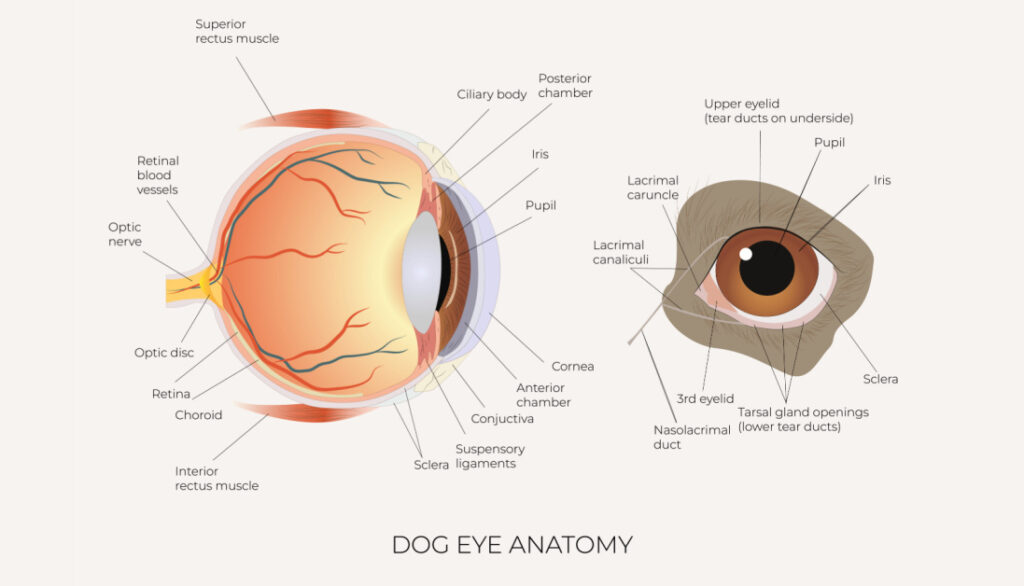
Common Eye Issues In Bearded Collie
As a veterinarian, I’ve seen a variety of eye issues in Bearded Collie dogs. These issues can impact your dog’s overall health and quality of life, so it’s important to be aware of them. Let’s explore some of the most common ones.
Cataracts is one of the primary eye problems that I come across frequently in Bearded Collies. This condition, characterized by a clouding of the lens, can cause vision loss and if left untreated, can lead to blindness. Early detection is crucial to prevent permanent damage.
Progressive Retinal Atrophy (PRA) is another common eye disease in this breed. It’s a degenerative disease that gradually leads to blindness. Unfortunately, there is no cure for PRA, but early detection can help manage the condition.
Bearded Collies are also susceptible to Cherry Eye, a condition where the third eyelid’s gland prolapses and becomes visible. Though it doesn’t cause blindness, it can be uncomfortable and needs immediate veterinary attention.
Keratoconjunctivitis Sicca (KCS) or Dry Eye is also common in this breed. It’s characterized by insufficient tear production, leading to dry, irritated eyes. If you notice your Bearded Collie squinting, or if their eyes appear red or have a sticky discharge, it could be a sign of KCS.
Lastly, Corneal Dystrophy, a condition that affects the cornea, is also seen in Bearded Collies. It can cause vision problems and discomfort.
As a dog parent, you need to be vigilant about your Bearded Collie’s eye health. Regular check-ups and prompt attention to any signs of eye problems are key to ensuring your pet’s overall well-being. Remember, your dog can’t tell you when something’s wrong, so it’s up to you to notice any changes in their behavior or appearance.
- Cataracts – Clouding of the lens, leading to vision loss
- Progressive Retinal Atrophy (PRA) – Degenerative disease leading to blindness
- Cherry Eye – Prolapse of the third eyelid’s gland
- Keratoconjunctivitis Sicca (KCS) – Dry Eye, leading to irritated eyes
- Corneal Dystrophy – Condition affecting the cornea, causing vision problems
These are just a few of the most common eye issues in Bearded Collies. If you notice any changes in your dog’s eyes or behavior, don’t hesitate to seek veterinary care. Early detection and treatment can make all the difference in your pet’s Bearded Collie eye health.
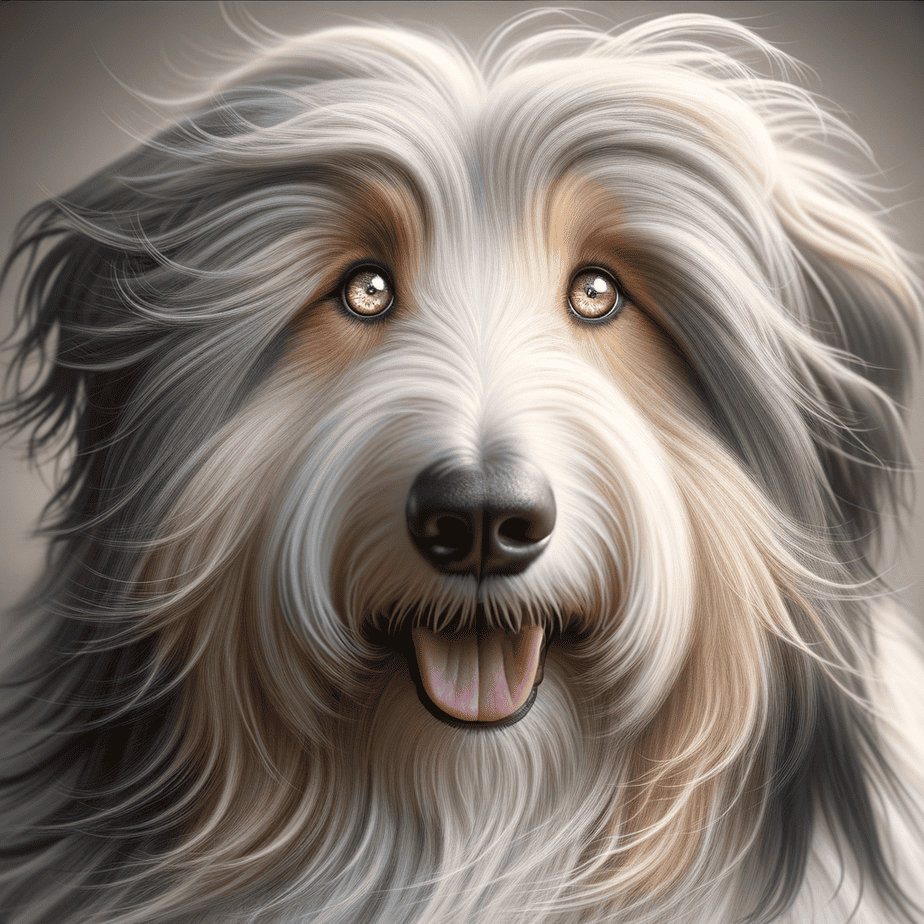
Nourishing Your Dog’s Vision: Essential Nutrients for Eye Health
Ensuring your Bearded Collie gets the right nutrients for optimal eye health is essential for maintaining clear vision and preventing age-related issues. Natural, nutrient-rich foods and supplements can play a key role in supporting their eyesight. From vitamin A-packed freeze-dried liver treats to antioxidant-rich blueberries and targeted supplements like Eyeplex by Standard Process, there are several ways to nourish your dog’s eyes. In this section, we’ll explore how these powerful ingredients contribute to long-term vision health and overall well-being.
Eyeplex by Standard Process
Eyeplex by Standard Process is a specialized supplement designed to support your Bearded Collie’s eye health with a blend of essential nutrients. Formulated with key vitamins, minerals, and antioxidants, Eyeplex helps protect against oxidative stress, supports retinal function, and promotes overall vision health. Ingredients like vitamin A, vitamin C, and zinc contribute to maintaining strong eyesight, while whole food ingredients provide additional phytonutrients for cellular protection. Adding Eyeplex to your Bearded Collie’s diet can be especially beneficial for aging dogs or breeds prone to eye conditions, offering targeted nutritional support to keep their vision sharp and healthy for years to come.
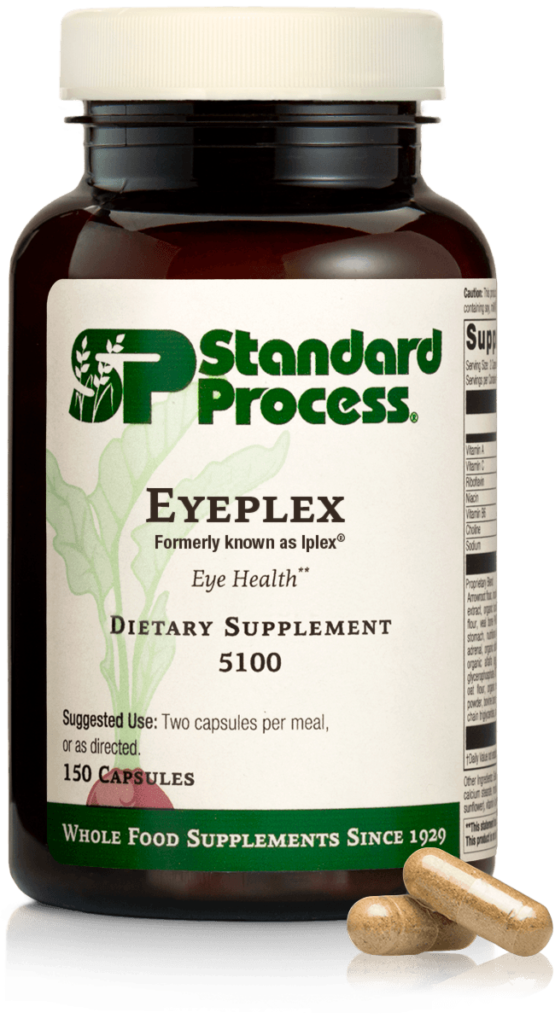
Freeze-Dried Blueberries
Freeze-dried blueberries are a powerhouse of antioxidants that can help protect your Bearded Collie’s eyes from oxidative stress and age-related damage. Rich in vitamins C and E, as well as anthocyanins, these tiny but mighty berries help combat free radicals that can contribute to eye diseases like cataracts and macular degeneration. Incorporating freeze-dried blueberries into your dog’s diet provides a natural and delicious way to support retinal health, reduce inflammation, and promote overall vision longevity. Plus, they’re a low-calorie, dog-friendly treat that makes a great addition to a balanced diet for long-term eye health.
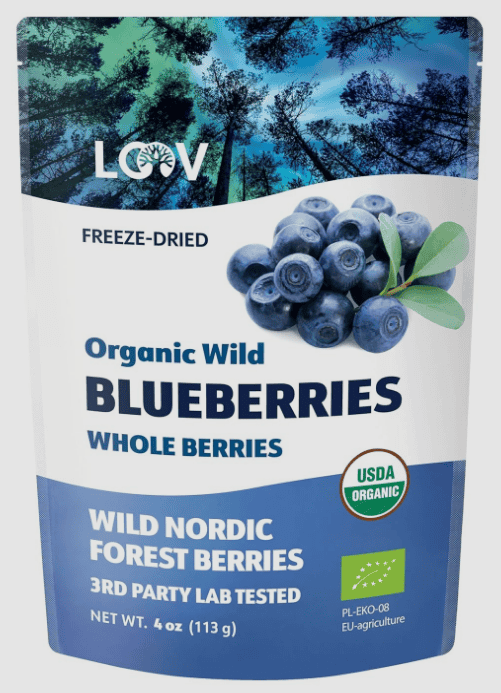
Freeze-Dried Liver
Freeze-dried liver treats are an excellent natural source of vitamin A, an essential nutrient for your Bearded Collie’s eye health. Vitamin A plays a crucial role in maintaining good vision, especially in low-light conditions, while also supporting overall immune function and skin health. Since liver is rich in bioavailable vitamin A, incorporating freeze-dried liver treats into your dog’s diet provides a convenient and nutritious way to promote optimal eye function. Just be sure to feed them in moderation, as excessive vitamin A can lead to toxicity. Adding these nutrient-packed treats to your pup’s routine is a simple, tasty way to support their long-term vision and well-being!

By prioritizing your Bearded Collie’s eye health through a balanced diet and nutritional supplements, you can help prevent many common eye issues. These simple steps can go a long way in ensuring your pup’s eyes stay healthy and clear for years to come.
Next, we’ll look at how maintaining a healthy environment can help prevent eye issues in your Bearded Collie.
Environmental Hygiene To Reduce Eye Problems
Just as important as diet and routine care, maintaining a clean and healthy environment can significantly contribute to your Bearded Collie’s eye health. Let’s take a closer look at how indoor air quality and the use of sprays, diffusers, candles, and incense can impact your furry friend’s eyes.
Indoor Air Quality
Bearded Collies, with their long, flowing hair, are prone to collect dust and allergens that can irritate their eyes. Therefore, maintaining good indoor air quality is crucial. Here are some tips:
- Regularly clean and dust your home to reduce allergens.
- Consider using an air purifier to filter out dust particles and allergens.
- Ensure proper ventilation in your home to avoid stale and dusty air.
- Avoid smoking indoors as it can cause eye irritation in dogs.
Remember, a clean environment is not just beneficial for your Bearded Collie’s eye health, but overall health as well.
Sprays, Diffusers, Candles, Incense
While we humans may enjoy the scent of air fresheners, candles, and incense, these can cause eye irritation in our dogs. Here’s what you can do:
- Opt for unscented or pet-safe products.
- Keep your dog out of the room while using these products and ensure the area is well-ventilated before letting them back in.
- Place candles and diffusers out of your dog’s reach to avoid accidental contact with their eyes.
By paying attention to these environmental factors, you can help prevent potential eye problems in your Bearded Collie. Remember, their eyes are just as sensitive as ours, and it’s our responsibility as pet parents to provide them with a safe and healthy environment.
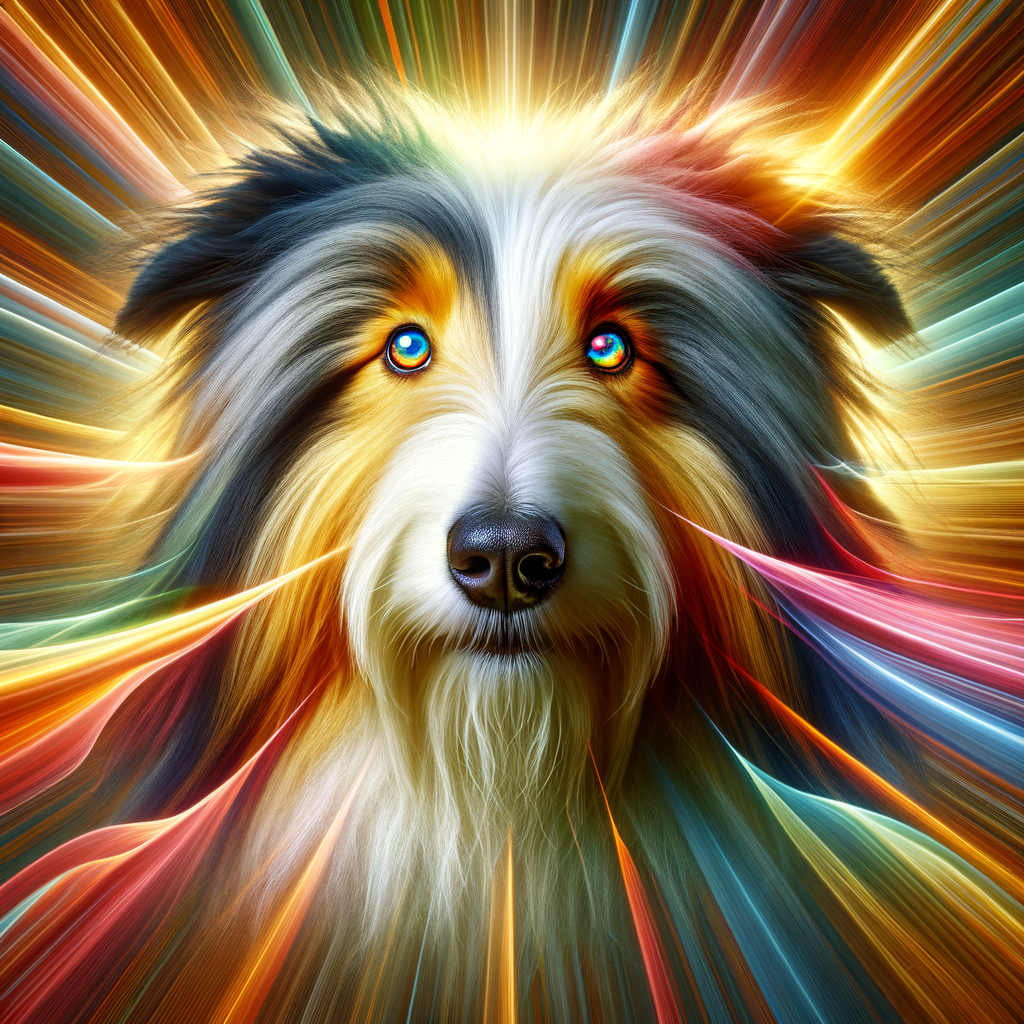
Ensuring routine eye care and maintenance for your Bearded Collie is paramount in preventing eye health issues. It’s not just about the periodic vet check-ups, but also about the daily and weekly care you provide at home.
Daily & Weekly Care & Maintenance
Regular cleaning is one of the key aspects of Bearded Collie eye care. Their long, droopy hair can often get into their eyes, causing irritation and increasing the risk of infection. Therefore, daily cleaning of the eye area with a soft, damp cloth can help keep the eyes clear and healthy. Make sure to use a separate cloth for each eye to avoid cross-contamination in case of an infection.
Weekly checks for redness, discharge, or any signs of discomfort can also help in early detection of potential problems. If your dog squints, blinks excessively, or seems to avoid light, it could be a sign of an eye issue that needs immediate veterinary attention.
Monitor Hair Length, Nail Length, Bath Frequency
When it comes to Bearded Collie Eye Health, their unique hair length plays a significant role. Keeping the hair around their eyes well-trimmed prevents it from poking and irritating the eyes. You can use rounded-tip scissors for safety, but if you’re not comfortable doing this yourself, a professional groomer can help.
Nail length is another factor to consider. Long nails can accidentally scratch the eyes, leading to severe problems. Regular nail trims ensure your dog’s nails stay at a safe length. Make sure to use dog-specific nail clippers and avoid cutting into the quick, as it can cause pain and bleeding.
Lastly, consider the frequency of baths. While baths help keep your Bearded Collie clean, excessive bathing can dry out their skin and eyes. Ideally, a bath every 4-6 weeks should suffice unless they get particularly dirty. Always use dog-friendly shampoos and try to avoid getting soap or water in their eyes.
By incorporating these practices into your pet care routine, you can contribute significantly to your Bearded Collie’s eye health. Remember, early detection and prevention are the best ways to combat potential eye issues. So, keep an eye on your dog’s eyes and make their health a priority!
Frequently Asked Questions
1. What are the common eye health conditions in Bearded Collies?
Bearded Collies can be prone to several eye health conditions, including:
- Progressive Retinal Atrophy (PRA)
- Cataracts
- Entropion
- Corneal Dystrophy
2. What is Progressive Retinal Atrophy (PRA) and how does it affect Bearded Collies?
Progressive Retinal Atrophy (PRA) is a genetic eye disorder that causes the degeneration of the retina over time. It can lead to gradual vision loss and eventually blindness in affected Bearded Collies.
3. Can eye conditions in Bearded Collies be treated?
The treatment options for eye conditions in Bearded Collies vary depending on the specific condition. Some conditions may require surgical intervention, while others may be managed through medication or supportive care. It is important to consult with a veterinarian for proper diagnosis and treatment recommendations.
4. How can I prevent eye health issues in my Bearded Collie?
While not all eye health issues can be prevented, there are steps you can take to minimize the risk:
- Regularly visit a veterinarian for comprehensive eye examinations.
- Ensure your Bearded Collie’s diet is balanced and includes essential nutrients for eye health.
- Avoid breeding dogs with known eye conditions to reduce the risk of passing them on to offspring.
- Protect your Bearded Collie’s eyes from injury or trauma.
5. When should I seek veterinary care for my Bearded Collie’s eye issues?
If you notice any signs of eye discomfort, such as redness, excessive tearing, squinting, cloudiness, or changes in vision, it is recommended to seek veterinary care promptly. Early detection and treatment can help prevent further complications and preserve your Bearded Collie’s eye health.
